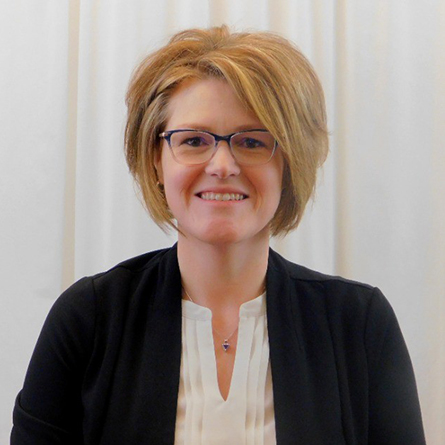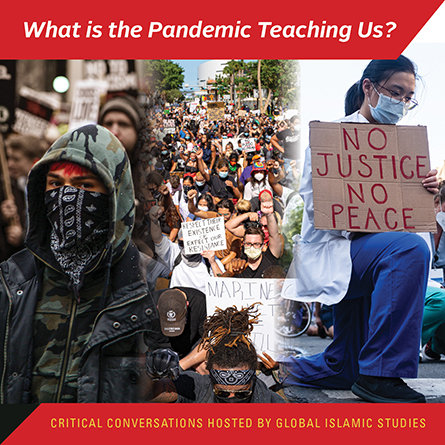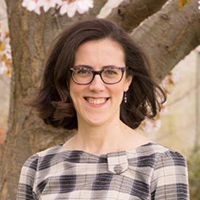
Global Islamic Studies hosts Critical Conversations series
Global Islamic Studies faculty are hosting a summer-long series of conversations for Connecticut College students, staff and faculty focused on critical questions about race, religion and politics that the COVID-19 pandemic has brought to the forefront in the U.S. and the world.
The series, “What Is the Pandemic Teaching Us? Critical Conversations hosted by Global Islamic Studies,” takes place every other Thursday at 4 p.m. through early August. The conversations take place virtually.
“Global Islamic Studies is interested in sharing what we know and learning from others in our community who critically study and work on problems of racism and inequality, including those associated with the Center for the Critical Study of Race and Ethnicity (CCSRE); the staff and student leaders within the division of Institutional Equity and Inclusion; and all those involved in The Agnes Gund ’60 Dialogue Project,” said Associate Professor of History and Director of the Global Islamic Studies Program Eileen Kane.
“We created this Critical Conversation series because we want to help advance this work: we want to dig deep and get at the root causes of systems of inequality that have long structured our world and are being illuminated now by the COVID-19 pandemic. We are interested in helping with the hard, necessary work of deciding what exactly ‘anti-racist education’ means to us as an educational community: what questions we need to be asking, what issues must be made central to our curriculum, and why it is often so difficult to have critical discussions about racism and inequality.”
The series kicked off on June 11 with “What Do We Mean When We Talk about Protests, Looting, and Violence? (And Why Is It a Problem to Bundle Them All Together?),” with Associate Professor of History and Director of the Africana Studies Program David Canton in conversation with Global Islamic Studies Professor Sufia Uddin. More than 70 students, staff and faculty members participated.
“I think this is a watershed moment,” Professor Canton said during the conversation. “There is so much systemic work that needs to be done. I hope now we are serious about it and can make the real change that we need.”
Canton said that not everyone is a lawyer, an organizer or a fundraiser, but that everyone can and should participate in their own way. “All of us have a lane where we can contribute,” he said.
The series continues June 25 with “What Is Antifa, Who Says It's a Terrorist Organization, and What Does This Have to Do with Protests in the U.S.?” with Assistant Professor of Government and International Relations Eric Fleury in conversation with Assistant Professor of History Dean Accardi.
Email invitations to participate in future conversations will be sent to Connecticut College students, staff and faculty.
The full series schedule is as follows:
“What Do We Mean When We Talk about Protests, Looting, and Violence? (And Why Is It a Problem to Bundle Them All Together?)”
June 11, 2020
History Professor David Canton in conversation with Global Islamic Studies Professor Sufia Uddin about anti-racist protests in the U.S.: their historical roots, and why it matters what words we use to describe them.
"What Is Antifa, Who Says It's a Terrorist Organization, and What Does This Have to Do with Protests in the U.S.?”
June 25, 2020
Government/International Relations Professor Eric Fleury in conversation with Global Islamic Studies/History Professor Dean Accardi about Antifa, the Trump administration's talk of creating a domestic terror law in response to nation-wide protests, and the politics of designating protestors “terrorists.”
“How COVID-19 Made Immigrants of Us All”
July 9, 2020
Sociology Professor Afshan Jafar in conversation with Global Islamic Studies/History Professor Eileen Kane about Jafar’s recent essay in the Blog of the LA Review of Books, in which she finds parallels between the experiences of immigrants and conditions under the COVID-19 pandemic.
“What Caused the COVID-19 Pandemic, and Why Is It Hitting Some Populations Harder Than Others?”
July 30, 2020
History Professor Sheetal Chhabria in conversation with Global Islamic Studies/Government Professor Caroleen Sayej on how public health crises like the COVID-19 pandemic are never simply natural or biological phenomena, but are manufactured by government policies. Austerity policies, especially in the global south, have made large populations vulnerable to COVID-19 outbreaks, and to a future, the UN has warned, of “Famines of Biblical Proportions.”
“Structural Racism in the U.S.: What Is It and Where Did It Come From?”
August 6, 2020
History Professor David Canton in conversation with Global Islamic Studies Professor Sufia Uddin about the government policies that have institutionalized racial inequalities and created the segregated society we live in today in the U.S.

